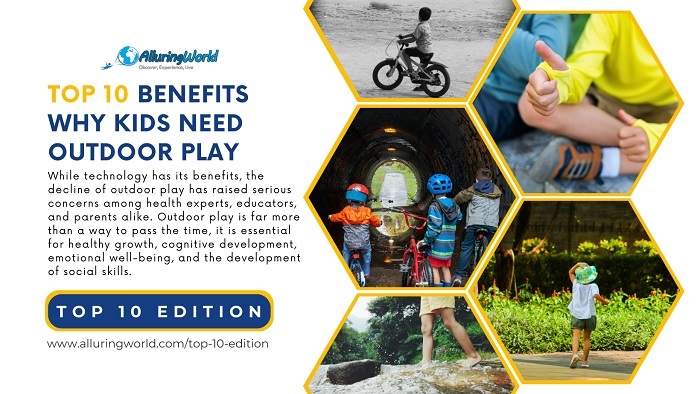Nowadays, as the world has turned more digital, children are unfortunately spending more time indoors than they were before. While technology has its benefits, the decline of outdoor play has raised serious concerns among health experts, educators, and parents alike. Outdoor play is far more than a way to pass the time—it is essential for healthy growth, cognitive development, emotional well-being, and the development of social skills. Backed by research, here are 10 scientifically proven reasons why outdoor play should remain a key part of your child’s life.
1. Boosts Physical Health
Children who spend time playing outdoors are more likely to be active, which directly improves cardiovascular health, strengthens muscles, and supports bone growth. Studies have shown that regular physical play exposure lowers the risk of childhood obesity and helps regulate blood pressure. Running, climbing, and jumping are natural ways kids build endurance and stamina—something that structured indoor exercise cannot always replicate.
2. Strengthens the Immune System
Outdoor environments expose children to fresh air, sunlight, and natural microbes, which help strengthen their immune systems. When children are exposed to moderate exposure of bacteria and dirt outdoors, as some researchers might suggest, this actually trains the body to fight infections more effectively. Sunlight also boosts vitamin D production, which is crucial for bone development and reducing the risk of autoimmune diseases later in life.
3. Improves Mental Health and Reduces Stress
Children who play outside regularly exhibit lower levels of cortisol—the hormone associated with stress. Nature has a calming effect on the brain, lowering anxiety and promoting relaxation. According to studies in child psychology, kids who spend time outdoors have a reduced risk of developing depression, while also experiencing improved emotional regulation and resilience.
4. Enhances Cognitive Development
Exposing the children to the ever-changing environments and challenges via outdoor play simply stimulates the brain, and it also encourages growth and development. When kids explore, solve problems, or create games outside, they engage their executive functions, such as planning, decision-making, and flexible thinking. Researchers have found that children who spend more time outdoors tend to perform better academically, particularly in subjects such as math and science, where problem-solving and observation skills are key.
5. Encourages Social Skills and Teamwork
Playgrounds and open spaces provide natural opportunities for children to interact with their peers, negotiate rules, and resolve conflicts. Different outdoor-friendly games like tag, hide-and-seek, or football foster cooperation, but most importantly, they teach the children about essential lessons of compromise and empathy. Developmental studies confirm that outdoor play helps kids build stronger social bonds and reduces feelings of isolation compared to solitary indoor play.
6. Sparks Creativity and Imagination
Despite children being used to being more creative indoors, usually done with structured environments, the outdoor play areas allow children to create their own rules and scenarios. A stick becomes a sword, a tree becomes a castle, and the backyard transforms into a world of endless adventure. There are certain experts in child development who emphasize that unstructured outdoor play enhances different thinking than those who play indoors, and this is beneficial for the foundation of creativity and innovation later in life.
7. Improves Attention and Focus
Children who struggle with attention difficulties, including ADHD, benefit greatly from outdoor play. Research published in the Journal of Attention Disorders found that children’s concentration improves significantly after spending time in green, outdoor settings, and time outside resets the brain, making it easier for kids to focus on tasks and schoolwork when they return indoors.
8. Promotes Emotional Resilience
The outdoor plays can be challenging to some children, such as climbing a tree, losing a game, or dealing with scraped knees, but this, in fact, is helping them to build resilience and coping skills. Unlike the controlled environment indoors, outdoor play presents unpredictability, which teaches kids how to adapt and overcome obstacles. There is an argument by some psychologists that this type of play builds confidence and prepares children to handle setbacks in other areas of life.
9. Strengthens Family Bonds
When families engage in outdoor activities together, whether it’s biking, hiking, or playing a game, it fosters stronger relationships. Simply put, outdoor play offers parents a chance to model healthy behaviors and spend quality time away from screens, which additionally helps to create lasting memories, increase family bonding, and build trust between parent and child.
10. Instills a Lifelong Connection with Nature
Higher appreciation is seen in children who regularly play outdoors, and as they grow up, they raise their awareness about the environment, which in turn leads to a stronger sense of responsibility towards nature. It has been confirmed that early exposure to green spaces not only improves immediate well-being, but the likelihood of engaging in outdoor recreation and environmental stewardship later in life is also increased. In these modern times with the topic of climate challenges, raising environmentally conscious children has never been more critical.
Overall, nowadays playing outdoors is not considered a luxury, but it is a biological and psychological necessity for children. The many benefits, from boosting immunity and physical fitness to improving attention span and emotional resilience, are undeniable and scientifically proven. Encouraging your child to spend more time outdoors isn’t just about fun; it’s about giving them the foundation for a healthier, happier, and more successful life. The best part? All it takes is a bit of open space, fresh air, and the freedom to play.

